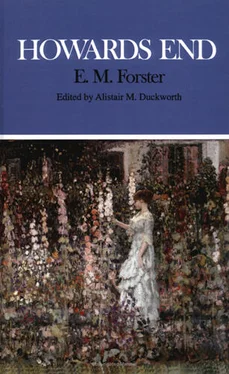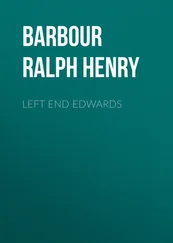Edward Morgan Forster - Howards End
Здесь есть возможность читать онлайн «Edward Morgan Forster - Howards End» весь текст электронной книги совершенно бесплатно (целиком полную версию без сокращений). В некоторых случаях можно слушать аудио, скачать через торрент в формате fb2 и присутствует краткое содержание. Жанр: Классическая проза, на английском языке. Описание произведения, (предисловие) а так же отзывы посетителей доступны на портале библиотеки ЛибКат.
- Название:Howards End
- Автор:
- Жанр:
- Год:неизвестен
- ISBN:нет данных
- Рейтинг книги:3 / 5. Голосов: 1
-
Избранное:Добавить в избранное
- Отзывы:
-
Ваша оценка:
- 60
- 1
- 2
- 3
- 4
- 5
Howards End: краткое содержание, описание и аннотация
Предлагаем к чтению аннотацию, описание, краткое содержание или предисловие (зависит от того, что написал сам автор книги «Howards End»). Если вы не нашли необходимую информацию о книге — напишите в комментариях, мы постараемся отыскать её.
Howards End — читать онлайн бесплатно полную книгу (весь текст) целиком
Ниже представлен текст книги, разбитый по страницам. Система сохранения места последней прочитанной страницы, позволяет с удобством читать онлайн бесплатно книгу «Howards End», без необходимости каждый раз заново искать на чём Вы остановились. Поставьте закладку, и сможете в любой момент перейти на страницу, на которой закончили чтение.
Интервал:
Закладка:
"What's happened?" asked Mrs. Warrington.
Then the car behind them drew up, and the voice of Charles was heard saying: "Get out the women at once." There was a concourse of males, and Margaret and her companions were hustled out and received into the second car. What had happened? As it started off again, the door of a cottage opened, and a girl screamed wildly at them.
"What is it?" the ladies cried.
Charles drove them a hundred yards without speaking. Then he said: "It's all right. Your car just touched a dog."
"But stop!" cried Margaret, horrified.
"It didn't hurt him."
"Didn't really hurt him?" asked Myra.
"No."
"Do please stop!" said Margaret, leaning forward. She was standing up in the car, the other occupants holding her knees to steady her. "I want to go back, please."
Charles took no notice.
"We've left Mr. Fussell behind," said another; "and Angelo, and Crane."
"Yes, but no woman."
"I expect a little of"—Mrs. Warrington scratched her palm—" will be more to the point than one of us!"
"The insurance company sees to that," remarked Charles, "and Albert will do the talking."
"I want to go back, though, I say!" repeated Margaret, getting angry.
Charles took no notice. The motor, loaded with refugees, continued to travel very slowly down the hill. "The men are there," chorused the others. "Men will see to it."
"The men can't see to it. Oh, this is ridiculous! Charles, I ask you to stop."
"Stopping's no good," drawled Charles.
"Isn't it?" said Margaret, and jumped straight out of the car.
She fell on her knees, cut her gloves, shook her hat over her ear. Cries of alarm followed her. "You've hurt yourself," exclaimed Charles, jumping after her.
"Of course I've hurt myself!" she retorted.
"May I ask what—"
"There's nothing to ask," said Margaret.
"Your hand's bleeding."
"I know."
"I'm in for a frightful row from the pater."
"You should have thought of that sooner, Charles."
Charles had never been in such a position before. It was a woman in revolt who was hobbling away from him, and the sight was too strange to leave any room for anger. He recovered himself when the others caught them up: their sort he understood. He commanded them to go back.
Albert Fussell was seen walking towards them.
"It's all right!" he called. "It wasn't a dog, it was a cat."
"There!" exclaimed Charles triumphantly. "It's only a rotten cat.
"Got room in your car for a little un? I cut as soon as I saw it wasn't a dog; the chauffeurs are tackling the girl." But Margaret walked forward steadily. Why should the chauffeurs tackle the girl? Ladies sheltering behind men, men sheltering behind servants—the whole system's wrong, and she must challenge it.
"Miss Schlegel! 'Pon my word, you've hurt your hand."
"I'm just going to see," said Margaret. "Don't you wait, Mr. Fussell."
The second motor came round the corner. "lt is all right, madam," said Crane in his turn. He had taken to calling her madam.
"What's all right? The cat?"
"Yes, madam. The girl will receive compensation for it."
"She was a very ruda girla," said Angelo from the third motor thoughtfully.
"Wouldn't you have been rude?"
The Italian spread out his hands, implying that he had not thought of rudeness, but would produce it if it pleased her. The situation became absurd. The gentlemen were again buzzing round Miss Schlegel with offers of assistance, and Lady Edser began to bind up her hand. She yielded, apologizing slightly, and was led back to the car, and soon the landscape resumed its motion, the lonely cottage disappeared, the castle swelled on its cushion of turf, and they had arrived. No doubt she had disgraced herself. But she felt their whole journey from London had been unreal. They had no part with the earth and its emotions. They were dust, and a stink, and cosmopolitan chatter, and the girl whose cat had been killed had lived more deeply than they.
"Oh, Henry," she exclaimed, "I have been so naughty," for she had decided to take up this line. "We ran over a cat. Charles told me not to jump out, but I would, and look!" She held out her bandaged hand. "Your poor Meg went such a flop."
Mr. Wilcox looked bewildered. In evening dress, he was standing to welcome his guests in the hall.
"Thinking it was a dog," added Mrs. Warrington.
"Ah, a dog's a companion!" said Colonel Fussell. "A dog'll remember you."
"Have you hurt yourself, Margaret?"
"Not to speak about; and it's my left hand."
"Well, hurry up and change."
She obeyed, as did the others. Mr. Wilcox then turned to his son.
"Now, Charles, what's happened?"
Charles was absolutely honest. He described what he believed to have happened. Albert had flattened out a cat, and Miss Schlegel had lost her nerve, as any woman might. She had been got safely into the other car, but when it was in motion had leapt out—again, in spite of all that they could say. After walking a little on the road, she had calmed down and had said that she was sorry. His father accepted this explanation, and neither knew that Margaret had artfully prepared the way for it. It fitted in too well with their view of feminine nature. In the smoking-room, after dinner, the Colonel put forward the view that Miss Schlegel had jumped it out of devilry. Well he remembered as a young man, in the harbour of Gibraltar once, how a girl—a handsome girl, too—had jumped overboard for a bet. He could see her now, and all the lads overboard after her. But Charles and Mr. Wilcox agreed it was much more probably nerves in Miss Schlegel's case. Charles was depressed. That woman had a tongue. She would bring worse disgrace on his father before she had done with them. He strolled out on to the castle mound to think the matter over. The evening was exquisite. On three sides of him a little river whispered, full of messages from the west; above his head the ruins made patterns against the sky. He carefully reviewed their dealings with this family, until he fitted Helen, and Margaret, and Aunt Juley into an orderly conspiracy. Paternity had made him suspicious. He had two children to look after, and more coming, and day by day they seemed less likely to grow up rich men. "It is all very well," he reflected, "the pater saying that he will be just to all, but one can't be just indefinitely. Money isn't elastic. What's to happen if Evie has a family? And, come to that, so may the pater. There'll not be enough to go round, for there's none coming in, either through Dolly or Percy. It's damnable!" He looked enviously at the Grange, whose windows poured light and laughter. First and last, this wedding would cost a pretty penny. Two ladies were strolling up and down the garden terrace, and as the syllables "Imperialism" were wafted to his ears, he guessed that one of them was his aunt. She might have helped him, if she too had not had a family to provide for. "Every one for himself," he repeated—a maxim which had cheered him in the past, but which rang grimly enough among the ruins of Oniton. He lacked his father's ability in business, and so had an ever higher regard for money; unless he could inherit plenty, he feared to leave his children poor.
As he sat thinking, one of the ladies left the terrace and walked into the meadow; he recognized her as Margaret by the white bandage that gleamed on her arm, and put out his cigar, lest the gleam should betray him. She climbed up the mound in zigzags, and at times stooped down, as if she was stroking the turf. It sounds absolutely incredible, but for a moment Charles thought that she was in love with him, and had come out to tempt him. Charles believed in temptresses, who are indeed the strong man's necessary complement, and having no sense of humour, he could not purge himself of the thought by a smile. Margaret, who was engaged to his father, and his sister's wedding-guest, kept on her way without noticing him, and he admitted that he had wronged her on this point. But what was she doing? Why was she stumbling about amongst the rubble and catching her dress in brambles and burrs? As she edged round the keep, she must have got to leeward and smelt his cigar-smoke, for she exclaimed, "Hullo! Who's that?"
Читать дальшеИнтервал:
Закладка:
Похожие книги на «Howards End»
Представляем Вашему вниманию похожие книги на «Howards End» списком для выбора. Мы отобрали схожую по названию и смыслу литературу в надежде предоставить читателям больше вариантов отыскать новые, интересные, ещё непрочитанные произведения.
Обсуждение, отзывы о книге «Howards End» и просто собственные мнения читателей. Оставьте ваши комментарии, напишите, что Вы думаете о произведении, его смысле или главных героях. Укажите что конкретно понравилось, а что нет, и почему Вы так считаете.












